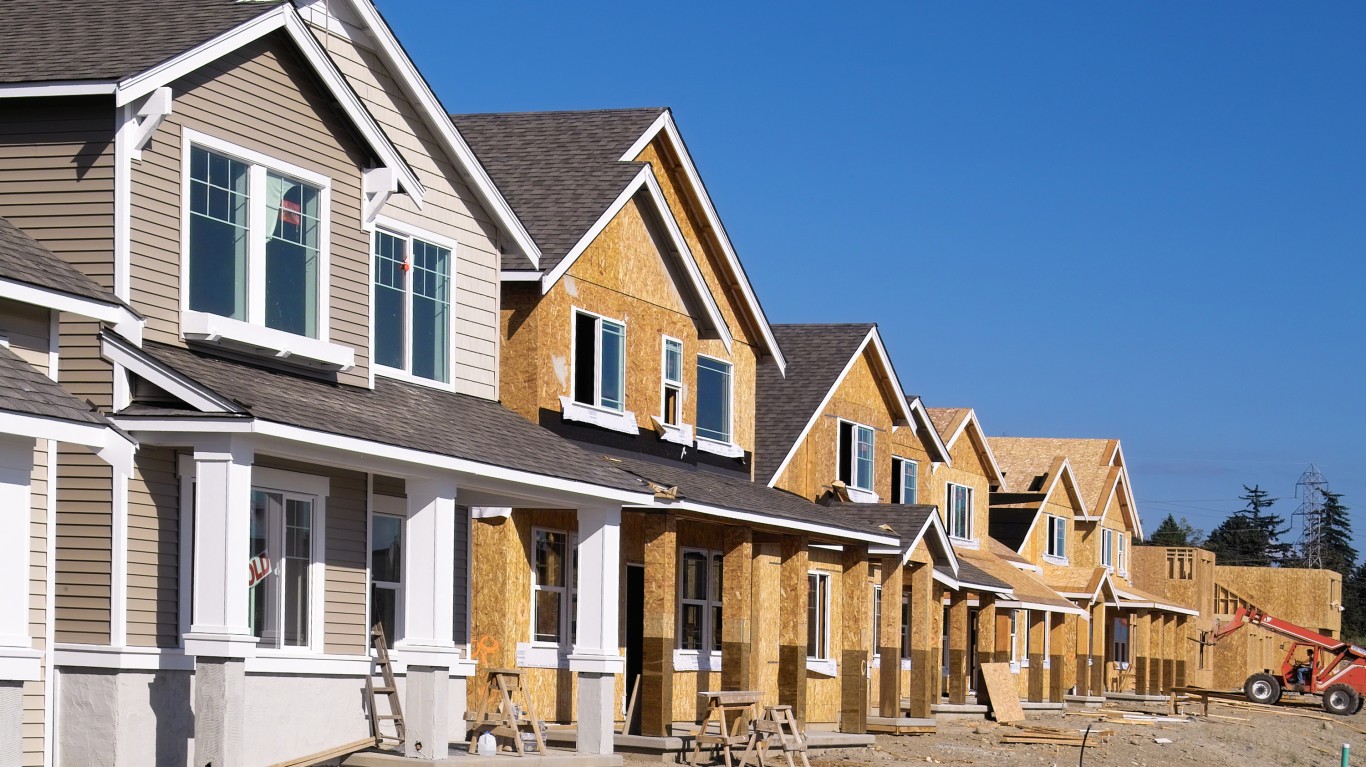
The Canada Mortgage and Housing Corporation (CMHC) reported last June that the country needed to build 3.5 million additional housing units between 2021 and 2030 on top of the projected rate of construction to achieve housing affordability for everyone living in Canada.
One year later, CMHC is sounding the alarm bells.
Last Friday, CMHC Chief Economist Bob Dugan suggested that housing affordability would worsen rather than improve in the years ahead if Canada didn’t address the shortage.
Falling Starts
Annual housing starts have been falling rather than increasing. In 2021, 271,000 homes were built. In 2022, the number fell to 260,000. Housing starts in May fell 23% compared to April. Dugan forecasts 215,000 homes will be built in Canada in 2023 at the midpoint of its guidance.
“I hope my forecast is wrong, but the way things are looking right now, I’m not optimistic that we’re on track to doubling the pace of housing starts,” Dugan told the Toronto Star on June 16.
Projections to 2030
CMHC CEO Remy Bowers believes one of the critical ways to solve the problem is to increase the construction of purpose-built rental properties dramatically. According to Bowers, there are 4.5 million purpose-built rental units in Canada. However, many of them are very old, built between 1960 and 1990.
“But because we haven’t invested in purpose-built rentals there’s just not enough supply to meet the demand,” Bowers said.
Residential REITS
Investors interested in placing bets on companies addressing the housing shortage generally look to residential real estate investment trusts (REITs) such as the Canadian Apartment Properties REIT (CA:CAR.UN). It’s the largest of the residential pure plays.
As at March 31, 2023, CAPREIT owns about 66,000 residential apartment suites, townhomes and manufactured home community sites across Canada and the Netherlands, with approximately $17 billion of investment properties in Canada and Europe, according to a June 15, 2023 filing. (All figures in Canadian dollars.)
Earlier this month, it announced the sale of about $103 million in non-core properties, taking most of those proceeds, $74 million, and reinvesting in new build properties.
Sadly, unlike the U.S., there are virtually no publicly traded homebuilders whose stocks you can buy, so you’re left investing in CAPREIT or one of the smaller ones listed on the TSX.
However, here is a way to play the housing shortage, as it’s not going away.
Vital Construction Loans
Building residential properties of any kind requires significant capital. While Canadian banks fill some of the financing needs of construction and real estate companies in Canada, there wouldn’t be nearly as big a housing crisis if the banks were more aggressive in lending for commercial projects of all sizes.
One company that looks to fill the needs of entrepreneurial builders is Toronto-based MCAN Financial Group (CA:MKP), Canada’s largest independent mortgage finance company. It had $4.1 billion in total assets as of Dec. 31, 2022.
Structured as a flow-through Mortgage Investment Corporation, it pays no taxes at the corporate level, passing all annual taxable earnings to shareholders, making it attractive for income-oriented investors.
The company has three operating segments: MCAN Home, which focuses on residential mortgages; MCAN Wealth, which provides guaranteed term deposits protected by the Canada Deposit Insurance Corporation (CDIC), up to $100,000 per insured category; and, MCAN Capital, which provides real estate construction and commercial loans through first and second mortgage financing solutions.
The construction loans make MKP stock an interesting bet on the housing shortage. With loans from companies like MCAN Financial, Canada has more hope of reaching housing affordability.
In addition to these construction loans, MCAN Capital invests in the private capital markets through investment funds managed by well-known real estate companies such as KingSett Capital and The Pearl Group.
MCAN Delivers
MCAN reported its first-quarter 2023 results in early May.
Its net investment income — which includes mortgage interest, equity income from its 14% ownership of MCAP Commercial LP (mortgage originator and servicer), income from marketable and non-marketable securities, and fees — was $49.51 million in the first quarter, 74% higher than a year earlier.
Its net income after operating expenses was $23.28 million ($0.67 per share), 50% higher year-over-year. The current quarterly dividend is $0.36. The annualized rate of $1.44 yields 8.9%.
In years when its taxable income exceeds its regular cash dividends, as in 2022, it pays out a special stock dividend. In 2022, it paid $1.44 in regular dividends and $0.97 as a special stock dividend. It does not anticipate paying a special stock dividend in 2023.
The company’s construction lending portfolio at the end of March was $856 million, up from $825 million at the end of December.
Consistent Income
“We focus our lending on the construction of affordable housing in urban/suburban growth markets with a preference for proximity to transit. This approach aims to mitigate the impact of price volatility and tightened sales activity in the event of market corrections,” states its Q1 2023 report.
It also makes multi-family residential loans that don’t meet traditional construction loan parameters. It amounted to $107 million at the end of March. Add in its various minority equity investments, and its commercial lending portfolio is well over $1 billion.
Its residential mortgage lending remains the biggest portion of its $4.2 billion investment portfolio, accounting for 67%.
Since 2014, MKP has paid out $13.78 a share in cash and stock dividends. While you won’t get rich on the capital appreciation, you’ll enjoy consistent income if held within a Canadian tax-advantaged account such as an RRSP, RRIF, or TFSA.
Not to mention you’ll play a small part in helping solve Canada’s housing shortage.
This article originally appeared on Fintel
Sponsored: Find a Qualified Financial Advisor
Finding a qualified financial advisor doesn’t have to be hard. SmartAsset’s free tool matches you with up to 3 fiduciary financial advisors in your area in 5 minutes. Each advisor has been vetted by SmartAsset and is held to a fiduciary standard to act in your best interests. If you’re ready to be matched with local advisors that can help you achieve your financial goals, get started now.






